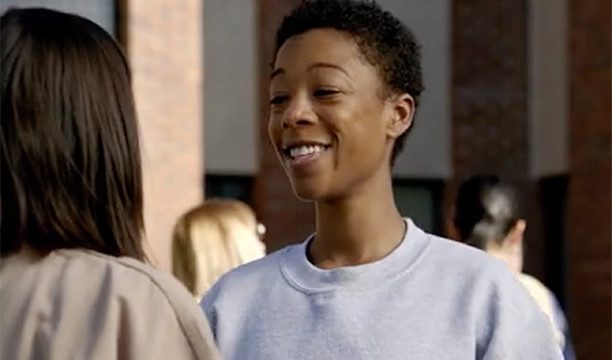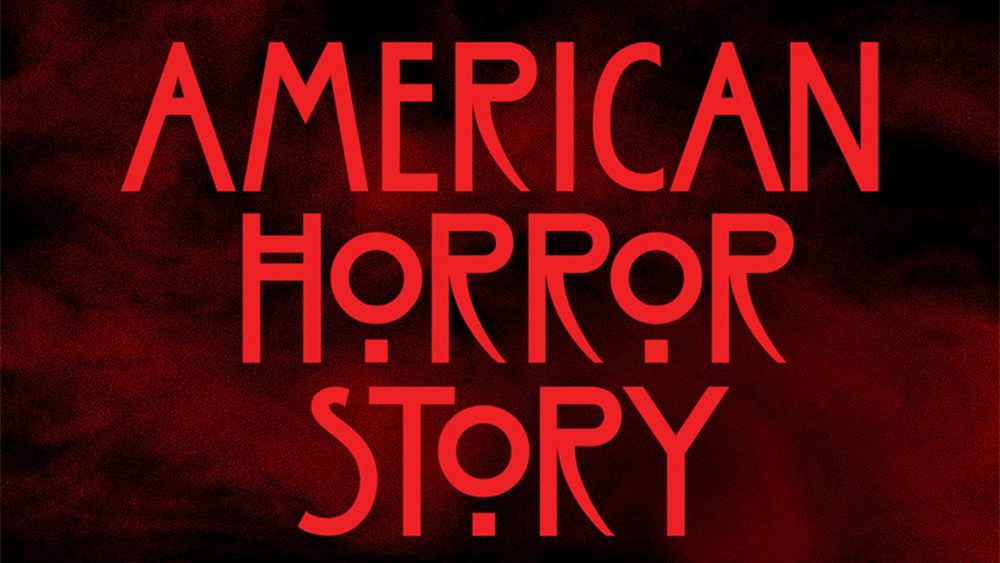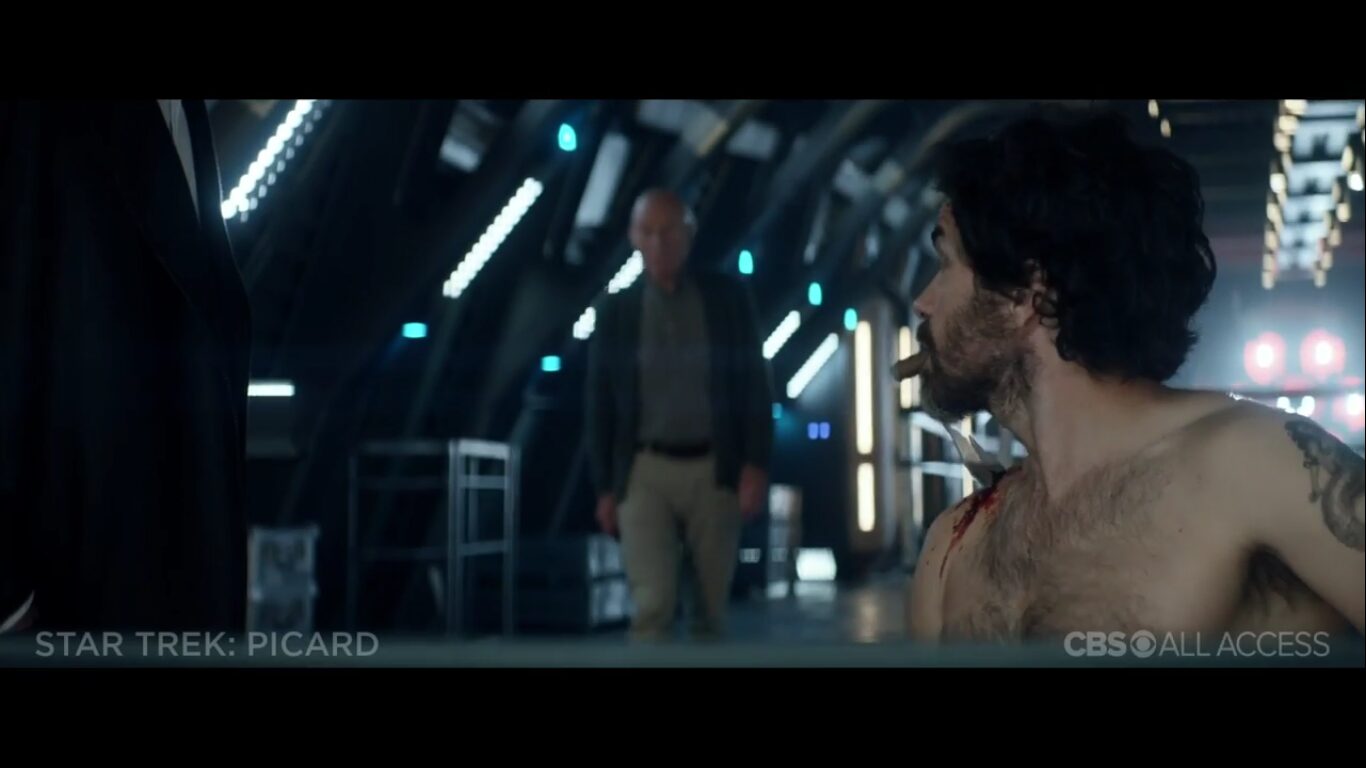How do you follow a series-best episode like “People Persons”? If you’re Orange Is the New Black, you come out swinging with “The Animals,” which is something like a perfect follow-up. I know I’ve been beating this drum for twelve episodes now, but I am quite frankly in awe at the level of sheer confidence in front of and behind the camera of this show.
To wit: Orange spent its first few episodes this season promising us a race war, only to pivot nicely. Normally this would feel like a cop-out, but Piscatella, Stratman, Humphrey, and Dixon have turned into such great antagonists that their behavior pretty believably fosters a mindset of “the enemy of my enemy is my friend” amongst the inmates. Brandy and Skinhead Helen – or “Coal Miner’s Daughter” and “Bald Eagle” according to Taystee, the queen of nicknames – actually approach some of the black inmates whom they’ve previously antagonized, trying to form an alliance.
The best part of this development is how natural the alliance, and the tension, feels. The meeting between the de facto heads of Litchfield’s racial factions is at turns funny and biting, especially with Brandy pointing out that “the brown ones” are louder than other inmates (her attempted high-five with Hapakuka is a nice sight gag, though). When it seems like the alliance is doomed before it can gain a foothold, Blanca forces everyone’s hand, jumping on the table in protest. Piper joins her. So does everyone else. It’s one of the strongest, most moving images in Orange‘s long history, not undercut in the slightest by the fact that it doesn’t work. Piscatella isn’t going anywhere. Neither is Humphrey. Or Stratman. Or Dixon.
But look: let’s talk about the elephant in the room. “The Animals” will always be know as “the one where Poussey dies” (worst Friends episode ever). Her death is absolutely devastating, and it never feels cheap. “The Animals” takes it time getting to that point, and it does so by taking an extremely satisfying route.
If we’re going to get deeper into my Iraq War allegory, let’s say that voluntary prison guards like Coates and Bayley are Army recruits (or any branch of the armed services; I’m certainly not trying to single out or disparage the Army). They’re young and misguided, and maybe didn’t join for the best of reasons (Bayley remarks that “it’s just a job”). They might find themselves in over their heads, like Bayley, or enjoying their authority too much, committing atrocities as a result, like Coates. That would make MCC – and Piscatella, Humphrey, Stratman, Dixon, and McCullough – private military contractors, enjoying the same lack of oversight and accountability that those men and women do overseas.
“The Animals” illustrates this nicely, using a flashback centered around Bayley of all people. It’s telling that Bayley is only the second guard, after Bennett, who has gotten his own flashback, when more impactful characters like Coates or even Pornstache are left mostly mysteries. So what do we learn about Bayley? Well, he was a pretty dumb kid. He hung out with his friends, slacking off at work, and occasionally throwing eggs at Litchfield inmates (Freida in this instance). And this man, if at his young age you can even call him that, is now in charge of the wellbeing of the women of the prison.
So is it any wonder that he makes such a colossal fuck-up? Sadly, no. (Again, not trying to disparage any branch of the armed forces; I’m just trying to make a point about hapless recruits versus cynical, power-mad veterans. I have no problem disparaging private military contractors.) When the guards start yanking inmates off of tables, there’s a terrifying sense of inevitability. Something is going to go wrong. Orange enlisted no less a talent than Matthew Weiner, the creator of Mad Men, to direct this installment, and it was a wise choice. His skill with character, and with personal, almost existential devastation, shines through in these scene more than any other.
Bayley restrains Poussey by pinning her down with his knee, and while he lacks the sadistic, aggressive streak of some of his new coworkers, he does more damage than any of them. It’s horrible for Poussey, who dies through no fault of her own. It’s horrible for Bayley, an overmatched if decent man who has now taken a life. And it’s horrible for Litchfield: all the inmates have now been shown, inarguably, that they are expendable. They can die by accident. (Look back; this is maybe the third death in Orange‘s entire run.) The shot of Taystee cradling Poussey’s body, howling like a wounded animal, is beautifully composed. And “The Animals” skips the traditional fade to orange, calling to mind some of the best episodes of Game of Thrones like “The Rains of Castamere” or “The Mountain and the Viper.” This is the prison’s darkest hour.
A Few Thoughts
- Thanks for everything, Samira Wiley. Poussey was often the beating heart of Litchfield, and despite her brief bout with alcoholism in season three, she always seemed like the one inmate who would emerge more or less intact. More than anything, her death marks the destruction of what remained of Litchfield’s innocence.
- “Even if you’re the city now, someday you’ll be the monster.” One of Caputo’s best lines.
- “It still works but it ain’t pretty, and don’t make my ass point out the metaphor.” One of Taystee’s best lines.
- It’s amazing that Doggett, a former fundamentalist bigot, is connecting so sincerely with two of the prison’s most out and proud lesbians.
- “Okay, well, I’ll just jot that down in my ‘facts about Francine’ notebook.” Vinny is pretty much saving Muccio’s tired storyline.
- I loved seeing Leanna and Angie eating Utz chips, which I choose to believe is a Mad Men reference.
- Here are the actors, as of now, who deserve Emmys for this season: Taryn Manning, Kate Mulgrew, Uzo Aduba, Brad William Henke, Nick Sandow, Lori Petty, Danielle Brooks.
- Mendoza putting Sophia’s wig back on for her was an unapologetically lovely scene.





